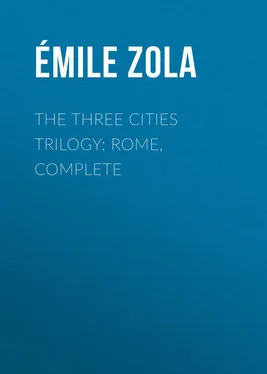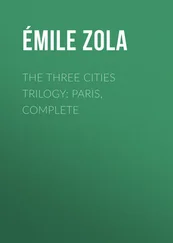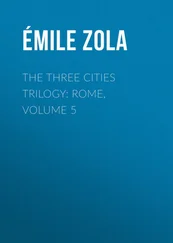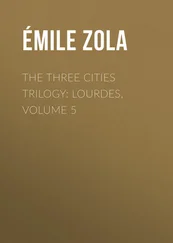Émile Zola - The Three Cities Trilogy - Rome, Complete
Здесь есть возможность читать онлайн «Émile Zola - The Three Cities Trilogy - Rome, Complete» — ознакомительный отрывок электронной книги совершенно бесплатно, а после прочтения отрывка купить полную версию. В некоторых случаях можно слушать аудио, скачать через торрент в формате fb2 и присутствует краткое содержание. Жанр: literature_19, foreign_antique, foreign_prose, на английском языке. Описание произведения, (предисловие) а так же отзывы посетителей доступны на портале библиотеки ЛибКат.
- Название:The Three Cities Trilogy: Rome, Complete
- Автор:
- Жанр:
- Год:неизвестен
- ISBN:нет данных
- Рейтинг книги:5 / 5. Голосов: 1
-
Избранное:Добавить в избранное
- Отзывы:
-
Ваша оценка:
- 100
- 1
- 2
- 3
- 4
- 5
The Three Cities Trilogy: Rome, Complete: краткое содержание, описание и аннотация
Предлагаем к чтению аннотацию, описание, краткое содержание или предисловие (зависит от того, что написал сам автор книги «The Three Cities Trilogy: Rome, Complete»). Если вы не нашли необходимую информацию о книге — напишите в комментариях, мы постараемся отыскать её.
The Three Cities Trilogy: Rome, Complete — читать онлайн ознакомительный отрывок
Ниже представлен текст книги, разбитый по страницам. Система сохранения места последней прочитанной страницы, позволяет с удобством читать онлайн бесплатно книгу «The Three Cities Trilogy: Rome, Complete», без необходимости каждый раз заново искать на чём Вы остановились. Поставьте закладку, и сможете в любой момент перейти на страницу, на которой закончили чтение.
Интервал:
Закладка:
Might not that time come in the crisis which was now at hand? Once more, all the powers are battling for possession of the people. Since the people, thanks to liberty and education, has become strong, since it has developed consciousness and will, and claimed its share of fortune, all rulers have been seeking to attach it to themselves, to reign by it, and even with it, should that be necessary. Socialism, therein lies the future, the new instrument of government; and the kings tottering on their thrones, the middle-class presidents of anxious republics, the ambitious plotters who dream of power, all dabble in socialism! They all agree that the capitalist organisation of the State is a return to pagan times, to the olden slave-market; and they all talk of breaking for ever the iron law by which the labour of human beings has become so much merchandise, subject to supply and demand, with wages calculated on an estimate of what is strictly necessary to keep a workman from dying of hunger. And, down in the sphere below, the evil increases, the workmen agonise with hunger and exasperation, while above them discussion still goes on, systems are bandied about, and well-meaning persons exhaust themselves in attempting to apply ridiculously inadequate remedies. There is much stir without any progress, all the wild bewilderment which precedes great catastrophes. And among the many, Catholic socialism, quite as ardent as Revolutionary socialism, enters the lists and strives to conquer.
After these explanations Pierre gave an account of the long efforts made by Catholic socialism throughout the Christian world. That which particularly struck one in this connection was that the warfare became keener and more victorious whenever it was waged in some land of propaganda, as yet not completely conquered by Roman Catholicism. For instance, in the countries where Protestantism confronted the latter, the priests fought with wondrous passion, as for dear life itself, contending with the schismatical clergy for possession of the people by dint of daring, by unfolding the most audacious democratic theories. In Germany, the classic land of socialism, Mgr. Ketteler was one of the first to speak of adequately taxing the rich; and later he fomented a wide-spread agitation which the clergy now directs by means of numerous associations and newspapers. In Switzerland Mgr. Mermillod pleaded the cause of the poor so loudly that the bishops there now almost make common cause with the democratic socialists, whom they doubtless hope to convert when the day for sharing arrives. In England, where socialism penetrates so very slowly, Cardinal Manning achieved considerable success, stood by the working classes on the occasion of a famous strike, and helped on a popular movement, which was signalised by numerous conversions. But it was particularly in the United States of America that Catholic socialism proved triumphant, in a sphere of democracy where the bishops, like Mgr. Ireland, were forced to set themselves at the head of the working-class agitation. And there across the Atlantic a new Church seems to be germinating, still in confusion but overflowing with sap, and upheld by intense hope, as at the aurora of the rejuvenated Christianity of to-morrow.
Passing thence to Austria and Belgium, both Catholic countries, one found Catholic socialism mingling in the first instance with anti-semitism, while in the second it had no precise sense. And all movement ceased and disappeared when one came to Spain and Italy, those old lands of faith. The former with its intractable bishops who contented themselves with hurling excommunication at unbelievers as in the days of the Inquisition, seemed to be abandoned to the violent theories of revolutionaries, whilst Italy, immobilised in the traditional courses, remained without possibility of initiative, reduced to silence and respect by the presence of the Holy See. In France, however, the struggle remained keen, but it was more particularly a struggle of ideas. On the whole, the war was there being waged against the revolution, and to some it seemed as though it would suffice to re-establish the old organisation of monarchical times in order to revert to the golden age. It was thus that the question of working-class corporations had become the one problem, the panacea for all the ills of the toilers. But people were far from agreeing; some, those Catholics who rejected State interference and favoured purely moral action, desired that the corporations should be free; whilst others, the young and impatient ones, bent on action, demanded that they should be obligatory, each with capital of its own, and recognised and protected by the State.
Viscount Philibert de la Choue had by pen and speech carried on a vigorous campaign in favour of the obligatory corporations; and his great grief was that he had so far failed to prevail on the Pope to say whether in his opinion these corporations should be closed or open. According to the Viscount, herein lay the fate of society, a peaceful solution of the social question or the frightful catastrophe which must sweep everything away. In reality, though he refused to own it, the Viscount had ended by adopting State socialism. And, despite the lack of agreement, the agitation remained very great; attempts, scarcely happy in their results, were made; co-operative associations, companies for erecting workmen’s dwellings, popular savings’ banks were started; many more or less disguised efforts to revert to the old Christian community organisation were tried; while day by day, amidst the prevailing confusion, in the mental perturbation and political difficulties through which the country passed, the militant Catholic party felt its hopes increasing, even to the blind conviction of soon resuming sway over the whole world.
The second part of Pierre’s book concluded by a picture of the moral and intellectual uneasiness amidst which the end of the century is struggling. While the toiling multitude suffers from its hard lot and demands that in any fresh division of wealth it shall be ensured at least its daily bread, the elite is no better satisfied, but complains of the void induced by the freeing of its reason and the enlargement of its intelligence. It is the famous bankruptcy of rationalism, of positivism, of science itself which is in question. Minds consumed by need of the absolute grow weary of groping, weary of the delays of science which recognises only proven truths; doubt tortures them, they need a complete and immediate synthesis in order to sleep in peace; and they fall on their knees, overcome by the roadside, distracted by the thought that science will never tell them all, and preferring the Deity, the mystery revealed and affirmed by faith. Even to-day, it must be admitted, science calms neither our thirst for justice, our desire for safety, nor our everlasting idea of happiness after life in an eternity of enjoyment. To one and all it only brings the austere duty to live, to be a mere contributor in the universal toil; and how well one can understand that hearts should revolt and sigh for the Christian heaven, peopled with lovely angels, full of light and music and perfumes! Ah! to embrace one’s dead, to tell oneself that one will meet them again, that one will live with them once more in glorious immortality! And to possess the certainty of sovereign equity to enable one to support the abominations of terrestrial life! And in this wise to trample on the frightful thought of annihilation, to escape the horror of the disappearance of the ego , and to tranquillise oneself with that unshakable faith which postpones until the portal of death be crossed the solution of all the problems of destiny! This dream will be dreamt by the nations for ages yet. And this it is which explains why, in these last days of the century, excessive mental labour and the deep unrest of humanity, pregnant with a new world, have awakened religious feeling, anxious, tormented by thoughts of the ideal and the infinite, demanding a moral law and an assurance of superior justice. Religions may disappear, but religious feelings will always create new ones, even with the help of science. A new religion! a new religion! Was it not the ancient Catholicism, which in the soil of the present day, where all seemed conducive to a miracle, was about to spring up afresh, throw out green branches and blossom in a young yet mighty florescence?
Читать дальшеИнтервал:
Закладка:
Похожие книги на «The Three Cities Trilogy: Rome, Complete»
Представляем Вашему вниманию похожие книги на «The Three Cities Trilogy: Rome, Complete» списком для выбора. Мы отобрали схожую по названию и смыслу литературу в надежде предоставить читателям больше вариантов отыскать новые, интересные, ещё непрочитанные произведения.
Обсуждение, отзывы о книге «The Three Cities Trilogy: Rome, Complete» и просто собственные мнения читателей. Оставьте ваши комментарии, напишите, что Вы думаете о произведении, его смысле или главных героях. Укажите что конкретно понравилось, а что нет, и почему Вы так считаете.












